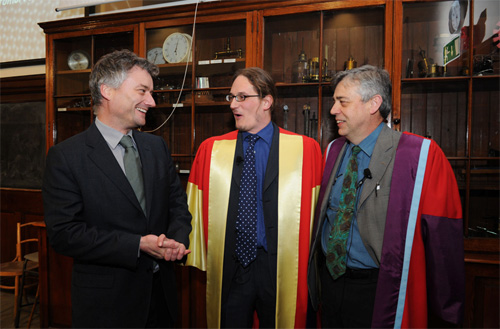Professor of Chemical Physics, Jonathan Coleman, Gives Inaugural Lecture
Posted on: 14 February 2012
Professor of Chemical Physics, Jonathan Coleman gave his inaugural lecture ‘Tiny but mighty: How today’s nano-materials will lead to tomorrow’s technologies’ on Wednesday February 8th, 2012 last. In his lecture Professor Coleman aimed to introduce the audience to nanoscience and nanomaterials and the following are extracts from his address:
“The last decade has seen growing interest in the inter-related fields of nanoscience, nanomaterials and nanotechnology. These areas involve the study of nanoscale objects less than 100 nanometres – a nanometre is one million times smaller than a millimetre. These interdisciplinary fields exist at the interface of physics, chemistry and biology and focus on how materials behave when produced with tiny dimensions. New technologies emerging from nanoscience will be critical for a range of industries and developments in the area have prompted significant investment into nano-related research by the Irish Government in recent years which has catapulted Ireland into the top ranks of nations in terms of the impact of nanoscience research.”

Provost, Dr Patrick Prendergast, Professor of Chemical Physics, Jonathan Coleman, and Professor of Physics, James Lunney.
“The key to utilising the potential of nanoscience lies in the ability to produce and manipulate nanomaterials. Over the last number of years my research has led to the development of a number of nanomaterials such as graphene and carbon nanotubes which have very exciting physical properties. Graphene is a single atom thick sheet of carbon, while nanotubes are graphene strips rolled into cylinders which can be very long and yet have diameters of only millionths of a millimetre. These materials are important as they are among the strongest, most electrically conductive materials known to man and are useful in a range of applications.”
“Working at the Trinity-based Centre for Research on Adaptive Nanostructures and Nanodevices (CRANN), our research group is attempting to take aggregated nanomaterials and dissolve them in liquids to produce individual nanoscale objects in very large quantities which could be used to benefit industry. Recently, I led a Science Foundation Ireland funded collaboration with Hewlett-Packard to develop new materials for applications as transparent electrodes in television or computer screens. It is thought that future screens will be very large in area and will be flexible, allowing them to be rolled or folded. Current technology does not allow this so the last decade has seen an intensive search for new transparent conducting materials. Our research group has developed methods to spray cast large area networks of silver nanowires. These networks are optically transparent and electrically very conductive and are ideal for display applications. The research in CRANN is now widely considered to be at the forefront of the nano field and it is hoped that this technology will ultimately find a commercial application in displays that can be rolled and folded within the next decade.”
A podcast of Prof Coleman’s lecture may be viewed here
About Professor Jonathan Coleman
Professor Coleman is a Science Foundation Ireland (SFI)-funded researcher from Trinity College Dublin’s nanoscience institute, CRANN and Trinity College Dublin’s School of Physics, who has achieved international success in the area of nanostructures. In 2011 Professor Coleman was announced as the ‘Science Foundation Ireland Researcher of the Year’.
Professor Coleman received his PhD from Trinity College Dublin Ireland in 1999. After his PhD he was awarded a Higher Education Authority Research Fellowship to continue his research into polymer-nanotube composites. In 2001 he became a contract lecturer in the School of Physics, Trinity College Dublin. He was a visiting scientist at the Nanotech Institute at the University of Texas at Dallas in 2002. Currently a Professor in the School of Physics, Professor Coleman has been elected to fellowship of the College. In 2010, Professor Coleman was awarded a European Research Council (ERC) Starter Grant of €1.5m which will support his research group for a period of five years. The prestigious ERC Starting Grants identify and support top scientists in Europe so that they will have the funding and encouragement to develop cutting edge technology.
